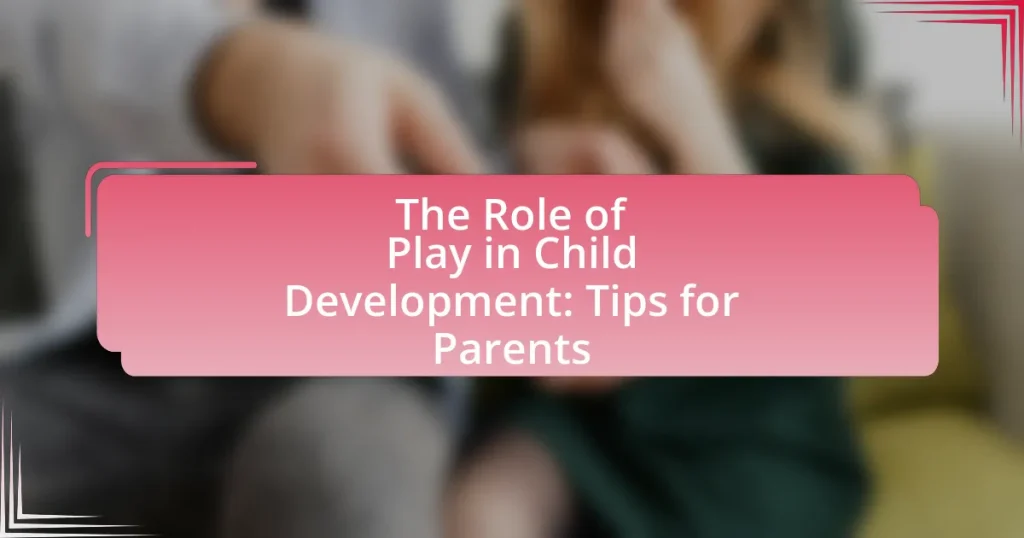The article focuses on the complexities of parenting a strong-willed child, characterized by traits such as independence, determination, and resistance to authority. It outlines effective strategies for parents, including setting clear boundaries, fostering open communication, and utilizing positive reinforcement to encourage desired behaviors. The article also discusses the identification of strong-willed traits, the impact of these behaviors on family dynamics, and the emotional challenges parents may face. Additionally, it provides practical tips for managing conflicts and maintaining consistency in parenting approaches, emphasizing the importance of understanding and adapting to a child’s unique temperament for positive outcomes.

What does it mean to parent a strong-willed child?
Parenting a strong-willed child means guiding a child who is determined, independent, and often resistant to authority. These children typically exhibit traits such as assertiveness, a strong sense of justice, and a desire for control over their environment. Effective parenting strategies for strong-willed children include setting clear boundaries, offering choices to foster independence, and using positive reinforcement to encourage desired behaviors. Research indicates that strong-willed children can thrive with consistent, respectful parenting approaches that acknowledge their unique temperament while providing structure and support.
How can parents identify strong-willed traits in their child?
Parents can identify strong-willed traits in their child by observing behaviors such as persistence in pursuing goals, resistance to authority, and a tendency to express strong opinions. These traits manifest when a child consistently challenges limits, seeks independence, and demonstrates determination in achieving their desires. Research indicates that strong-willed children often exhibit high levels of self-confidence and assertiveness, which can be seen in their refusal to back down from disagreements or their insistence on doing things their own way. Recognizing these behaviors helps parents understand their child’s personality and adapt their parenting strategies accordingly.
What are common characteristics of strong-willed children?
Strong-willed children typically exhibit characteristics such as independence, determination, and assertiveness. These children often display a strong sense of self and are not easily swayed by others, which can manifest as a desire to make their own choices and resist authority. Research indicates that strong-willed children may also show high levels of energy and enthusiasm, coupled with a tendency to challenge limits and rules. This behavior is often rooted in their innate drive to explore and assert their individuality, making them more likely to engage in problem-solving and critical thinking from a young age.
How do strong-willed traits manifest in different age groups?
Strong-willed traits manifest differently across age groups, with distinct behaviors observable in children, adolescents, and adults. In early childhood, strong-willed children often exhibit assertiveness, resistance to authority, and a desire for independence, as evidenced by their frequent questioning of rules and insistence on making choices. During adolescence, these traits may evolve into a more pronounced defiance, where strong-willed teens challenge societal norms and parental expectations, often seeking autonomy and self-identity. In adulthood, strong-willed individuals typically display determination and persistence in achieving their goals, often leading to leadership roles or entrepreneurial ventures, as they harness their assertiveness to navigate challenges effectively. Research indicates that these traits can be linked to higher levels of self-efficacy and resilience across all age groups, supporting the notion that strong-willed individuals often thrive in environments that allow for autonomy and self-direction.
Why is understanding strong-willed behavior important for parents?
Understanding strong-willed behavior is important for parents because it enables them to effectively guide and support their children. Strong-willed children often exhibit high levels of independence and assertiveness, which can lead to conflicts if not managed properly. By recognizing these traits, parents can adopt strategies that channel their child’s determination positively, fostering resilience and problem-solving skills. Research indicates that children with strong-willed behavior can thrive in environments where their autonomy is respected, leading to better emotional and social outcomes. Thus, understanding this behavior allows parents to create a nurturing atmosphere that promotes growth and cooperation.
How does strong-willed behavior impact family dynamics?
Strong-willed behavior significantly impacts family dynamics by creating both challenges and opportunities for growth. Families may experience increased conflict due to the assertiveness and independence exhibited by strong-willed individuals, which can lead to power struggles and heightened stress levels. However, this behavior can also foster resilience and adaptability within the family unit, encouraging members to develop effective communication and negotiation skills. Research indicates that strong-willed children often push parents to adopt more flexible parenting strategies, ultimately enhancing family cohesion and problem-solving abilities.
What are the long-term effects of parenting a strong-willed child?
Parenting a strong-willed child can lead to several long-term effects, including increased resilience, leadership skills, and potential challenges in social relationships. Research indicates that strong-willed children often develop a high degree of self-confidence and independence, which can translate into effective problem-solving abilities and assertiveness in adulthood. However, these traits may also result in difficulties with authority figures and peer relationships if not managed properly. A study published in the Journal of Child Psychology and Psychiatry found that strong-willed children, when guided with positive reinforcement and consistent boundaries, are more likely to thrive in environments that value their assertiveness and creativity. Conversely, if their strong will is met with excessive control or negativity, they may struggle with compliance and social integration later in life.

What challenges do parents face when raising a strong-willed child?
Parents face significant challenges when raising a strong-willed child, primarily due to the child’s intense independence and resistance to authority. This strong-willed nature often leads to frequent power struggles, as these children may refuse to comply with rules or expectations set by their parents. Research indicates that approximately 10-20% of children exhibit strong-willed behavior, which can result in heightened frustration for parents who seek cooperation and compliance. Additionally, parents may experience emotional exhaustion from the constant negotiation and conflict, as well as feelings of inadequacy when traditional parenting strategies fail. These challenges necessitate the development of tailored approaches that emphasize understanding, patience, and effective communication to foster a positive parent-child relationship.
How can parents effectively manage conflicts with a strong-willed child?
Parents can effectively manage conflicts with a strong-willed child by employing consistent communication, setting clear boundaries, and using positive reinforcement. Strong-willed children often respond better to discussions that involve their input, so parents should encourage open dialogue to understand their child’s perspective. Establishing clear and consistent rules helps the child know what is expected, reducing the likelihood of conflicts. Additionally, positive reinforcement for desired behaviors can motivate strong-willed children to comply with expectations, as studies show that children are more likely to repeat behaviors that are rewarded.
What strategies can help de-escalate power struggles?
To de-escalate power struggles, employing strategies such as active listening, offering choices, and maintaining a calm demeanor is effective. Active listening involves acknowledging the child’s feelings and perspectives, which can reduce tension and foster cooperation. Offering choices empowers the child, allowing them to feel a sense of control while still guiding them toward acceptable options. Maintaining a calm demeanor helps to model emotional regulation, which can diffuse escalating situations. Research indicates that these strategies can lead to more positive interactions and reduce conflict, as they promote understanding and collaboration between parent and child.
How can parents set boundaries without triggering resistance?
Parents can set boundaries without triggering resistance by involving their children in the decision-making process. When children feel they have a say in the rules that affect them, they are more likely to accept those boundaries. Research indicates that collaborative approaches, such as discussing the reasons behind rules and allowing children to express their opinions, can significantly reduce opposition. For instance, a study published in the Journal of Child Psychology and Psychiatry found that children who participated in setting family rules exhibited higher compliance and lower levels of defiance. This approach fosters a sense of ownership and respect, making it easier for parents to enforce boundaries without provoking resistance.
What emotional challenges do parents experience?
Parents experience emotional challenges such as stress, anxiety, and feelings of inadequacy when raising a strong-willed child. These challenges arise from the constant need to manage their child’s assertive behavior, which can lead to conflicts and frustration. Research indicates that parents of strong-willed children often report higher levels of parental stress, as they navigate the complexities of discipline and emotional regulation. A study published in the Journal of Child Psychology and Psychiatry found that parents of children with strong temperaments are more likely to experience emotional distress, highlighting the significant impact of a child’s behavior on parental well-being.
How can frustration and stress affect parenting decisions?
Frustration and stress can significantly impair parenting decisions by leading to impulsive reactions and reduced patience. When parents experience high levels of frustration, they may resort to harsh disciplinary measures or inconsistent parenting practices, which can negatively impact a child’s behavior and emotional development. Research indicates that stress can diminish cognitive functioning, making it harder for parents to think clearly and make thoughtful decisions. For instance, a study published in the Journal of Family Psychology found that parents under stress are more likely to engage in negative parenting behaviors, such as yelling or withdrawing affection, which can create a cycle of conflict and further stress within the family dynamic.
What support systems are available for parents of strong-willed children?
Support systems available for parents of strong-willed children include parenting classes, support groups, and professional counseling. Parenting classes provide strategies and techniques tailored to managing strong-willed behavior, while support groups offer a community of shared experiences and advice. Professional counseling can help parents develop personalized approaches to discipline and communication. Research indicates that these support systems can significantly improve parenting skills and reduce stress, enhancing the parent-child relationship.

What strategies can parents use to navigate the challenges of parenting a strong-willed child?
Parents can navigate the challenges of parenting a strong-willed child by employing strategies such as setting clear boundaries, using positive reinforcement, and fostering open communication. Establishing clear boundaries helps the child understand expectations and consequences, which is crucial for their development. Positive reinforcement encourages desired behaviors by rewarding compliance and effort, making the child more likely to repeat those behaviors. Additionally, fostering open communication allows parents to understand their child’s perspective, promoting cooperation and reducing power struggles. Research indicates that these strategies can lead to improved behavior and stronger parent-child relationships, as evidenced by studies showing that children respond positively to consistent boundaries and supportive communication.
How can positive reinforcement be utilized effectively?
Positive reinforcement can be utilized effectively by consistently rewarding desired behaviors to encourage their recurrence. For instance, when a strong-willed child completes a task or exhibits good behavior, providing immediate praise or tangible rewards reinforces that behavior. Research indicates that positive reinforcement increases the likelihood of behavior repetition; a study published in the Journal of Applied Behavior Analysis found that children who received positive reinforcement showed a 30% increase in desired behaviors compared to those who did not. This method fosters a supportive environment, making children more receptive to guidance and reducing resistance.
What types of rewards are most effective for strong-willed children?
Effective rewards for strong-willed children include intrinsic motivation, tangible rewards, and social recognition. Intrinsic motivation, such as allowing children to choose their own activities or setting personal goals, fosters a sense of autonomy and encourages them to engage willingly. Tangible rewards, like stickers or small toys, can be effective when linked to specific behaviors, as they provide immediate gratification. Social recognition, such as praise or public acknowledgment of achievements, reinforces positive behavior and builds self-esteem. Research indicates that strong-willed children respond well to rewards that align with their interests and values, making these types of rewards particularly effective in promoting desired behaviors.
How can parents create a system of incentives that works?
Parents can create a system of incentives that works by establishing clear, achievable goals and pairing them with meaningful rewards. This approach aligns with behavioral psychology principles, where positive reinforcement encourages desired behaviors. For instance, research indicates that children respond well to specific, immediate rewards, such as praise or small privileges, when they meet set expectations. By consistently applying this method, parents can effectively motivate their strong-willed children to engage in positive behaviors, fostering a cooperative environment.
What role does communication play in parenting a strong-willed child?
Communication is essential in parenting a strong-willed child as it fosters understanding and cooperation. Effective communication allows parents to express expectations clearly and listen to their child’s perspectives, which can reduce power struggles. Research indicates that strong-willed children often respond better to collaborative dialogue rather than authoritarian commands, leading to improved behavior and emotional regulation. For instance, a study published in the Journal of Child Psychology and Psychiatry found that children who engage in open communication with their parents exhibit higher levels of self-regulation and social competence. Thus, prioritizing communication helps parents navigate the challenges associated with raising strong-willed children.
How can parents foster open dialogue with their child?
Parents can foster open dialogue with their child by actively listening and creating a safe space for communication. Active listening involves giving full attention to the child, acknowledging their feelings, and responding thoughtfully, which encourages the child to express themselves freely. Creating a safe space means ensuring that the child feels comfortable sharing their thoughts without fear of judgment or punishment. Research indicates that children who feel heard are more likely to engage in open conversations, leading to stronger parent-child relationships.
What techniques can improve listening and understanding?
Active listening techniques can significantly improve listening and understanding. These techniques include maintaining eye contact, providing verbal affirmations, and summarizing what the speaker has said to confirm comprehension. Research indicates that active listening enhances communication effectiveness, as demonstrated in a study published in the Journal of Applied Psychology, which found that active listeners are perceived as more empathetic and engaged, leading to better interpersonal relationships. Additionally, practicing reflective listening, where one paraphrases the speaker’s message, can further clarify understanding and foster a supportive dialogue, particularly important in parenting scenarios involving strong-willed children.
What are some practical tips for parents dealing with strong-willed behavior?
To effectively manage strong-willed behavior, parents should establish clear boundaries while allowing children to make choices within those limits. This approach fosters a sense of autonomy, which is crucial for strong-willed children. For instance, offering two options for a task, such as choosing between two outfits, empowers the child while maintaining parental control. Additionally, using positive reinforcement to acknowledge desired behaviors encourages compliance and cooperation. Research indicates that children respond well to praise, which can enhance their motivation to follow rules. Consistency in enforcing boundaries is also essential; it helps children understand expectations and consequences, reducing power struggles.
How can parents maintain consistency in their approach?
Parents can maintain consistency in their approach by establishing clear rules and expectations that are consistently enforced. This involves communicating these guidelines to their children and ensuring that all caregivers are aligned in their responses to behavior. Research indicates that consistent parenting leads to better behavioral outcomes in children, as it provides a stable environment where children understand the consequences of their actions. For example, a study published in the Journal of Family Psychology found that children with consistent parenting styles exhibited fewer behavioral problems compared to those with inconsistent approaches.
What are effective ways to model flexibility and compromise?
Effective ways to model flexibility and compromise include demonstrating open-mindedness in discussions and actively seeking win-win solutions. Parents can show flexibility by adapting their expectations and being willing to adjust rules when appropriate, which teaches children the importance of considering different perspectives. Compromise can be modeled through collaborative decision-making, where parents and children negotiate outcomes that satisfy both parties, reinforcing the idea that cooperation leads to positive results. Research indicates that children who observe their parents practicing flexibility and compromise are more likely to adopt these behaviors themselves, fostering better conflict resolution skills and emotional intelligence.














